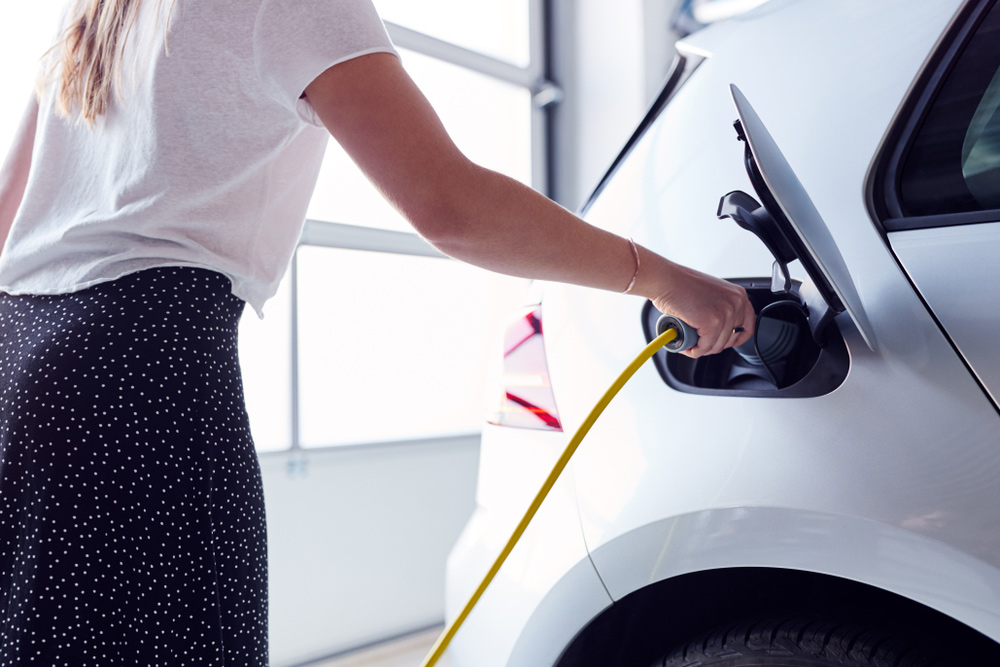Book a consultation so we can advise how much power you have available to charge your vehicle and then choose the correct charger.
What Is EV Charging And How Does It Work
Electric Vehicle (EV) charging is the process of replenishing the battery of electric vehicles by transferring electrical energy into them. This process is akin to filling a conventional vehicle with petrol or diesel, but instead, EVs receive electricity. The charging system involves a network of hardware (the charging station) and software (for managing the charging process), ensuring the vehicle’s battery is charged safely and efficiently. When an EV is connected to a charging station, electricity is converted from AC (Alternating Current) to DC (Direct Current), the form required to charge the battery. This conversion is either done by the charger or the car, depending on the type of charging.

Home And Commercial Charging Solutions
For home charging, there are various solutions available, ranging from simple wall-mounted chargers to sophisticated systems integrated with home energy management. These chargers are typically either Level 1 or Level 2, with the latter being faster. Commercial charging solutions, on the other hand, cater to businesses and public spaces. These include more robust systems capable of handling multiple vehicles and offering faster charging speeds. Commercial chargers often come with advanced features like smart metering, remote management and integration with renewable energy sources.
How Public EV Charging Stations Work And Locations
Public EV charging stations are an important part of the EV infrastructure, providing drivers with the ability to charge their vehicles while away from home. These stations work similarly to home chargers but are typically more powerful. They are often located in public parking areas, shopping centres and along major highways to provide convenient access for EV drivers. Many public charging stations are networked, allowing users to locate and check the availability of chargers via apps or online platforms.
Difference Between L1, L2 And L3 Charging
The main types of EV charging are Level 1 (L1), Level 2 (L2) and Level 3 (L3). L1 charging is the slowest, using a standard household outlet to deliver power. It’s suitable for overnight charging or for vehicles with smaller batteries. L2 charging is faster, requiring a dedicated charging unit and a higher power outlet, commonly found in homes and public charging stations. L3 charging, also known as DC fast charging, is the quickest method, capable of charging an EV battery to 80% in about 30 minutes. However, not all EVs are compatible with L3 charging.
Charging Time And Adapters
The time it takes to charge an EV depends on the battery size and the charger’s power output. L1 chargers can take several hours to fully charge a battery, while L2 chargers can do it in a shorter time, typically 4-6 hours. L3 chargers are the fastest, but frequent use can affect battery life. Adapters are available for EVs to enable them to use different types of chargers. These adapters can be particularly useful for drivers who travel long distances and may encounter various charging stations.

What types of EV charging services do you offer?
We provide comprehensive EV charging solutions tailored for both residential and commercial needs. This includes the installation and maintenance of various types of EV chargers, ensuring compatibility and efficiency for all-electric vehicle models. Ready to electrify your space with efficient EV charging? Contact us today to explore your options and get started!
How do I know if my home or business is suitable for EV charger installation?
At O’Brien Electrical Camberwell, our team conducts thorough assessments to determine the best EV charging setup for your property. We consider factors like electrical capacity, parking space and specific charging requirements to ensure a seamless and safe installation. Ready to electrify your space with efficient and reliable EV charging solutions? Get in touch with us today to schedule a consultation and take the first step towards a greener, more sustainable future.
What safety measures are in place for EV charging installations?
Safety is our top priority. Our installations comply with all local standards and regulations. We ensure every EV charging station is equipped with safety features like circuit protection and weatherproofing for outdoor installations. If you’re considering an EV charging solution and prioritise safety as much as we do, reach out to us today to discuss how we can tailor a safe and efficient charging setup for your needs.
Are there different types of EV chargers and how do I choose the right one?
There are mainly three types of EV chargers – Level 1, Level 2 and DC Fast Chargers. We help you choose the right charger based on your available power supply, vehicle’s compatibility, charging speed requirements and usage patterns. Contact us for more information on our services!
